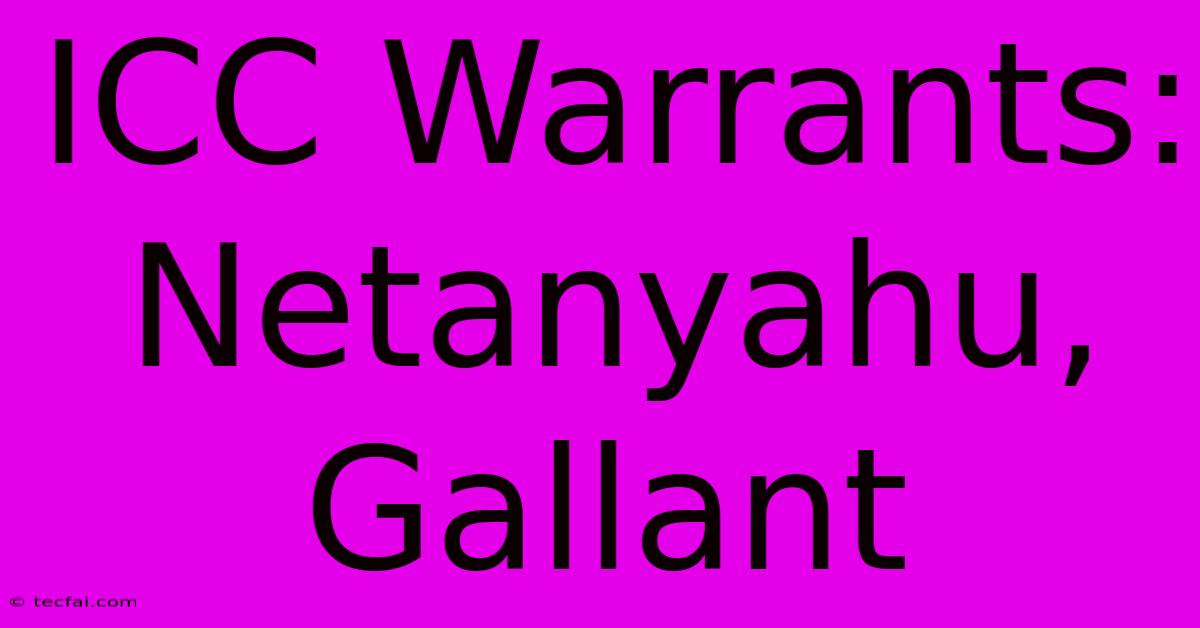ICC Warrants: Netanyahu, Gallant

Discover more detailed and exciting information on our website. Click the link below to start your adventure: Visit Best Website tecfai.com. Don't miss out!
Table of Contents
ICC Warrants: Netanyahu, Gallant – A Deep Dive into the International Criminal Court's Investigation
The International Criminal Court (ICC) investigation into alleged war crimes in the Palestinian Territories has thrust Israeli Prime Minister Benjamin Netanyahu and Defense Minister Yoav Gallant into the international spotlight. The issuance of potential arrest warrants, though not yet confirmed publicly, has ignited a firestorm of debate, raising critical questions about international law, Israeli sovereignty, and the complex geopolitical landscape of the region. This article delves into the intricacies of the situation, exploring the accusations, the legal framework, and the potential consequences.
Understanding the ICC's Jurisdiction
The ICC's jurisdiction is predicated on the principle of complementarity. This means the Court only intervenes when national authorities are unwilling or unable genuinely to investigate and prosecute crimes within their jurisdiction. The ICC's Rome Statute, which established the Court, defines several core international crimes, including war crimes, crimes against humanity, and genocide. The ongoing investigation focuses on alleged violations committed in the occupied Palestinian territories since June 13, 2014.
The Allegations Against Netanyahu and Gallant
While the ICC hasn't publicly confirmed specific charges against Netanyahu and Gallant, the investigation encompasses a broad range of alleged actions by Israeli officials. These may include accusations related to the planning and execution of military operations, the treatment of Palestinian civilians, and the construction of settlements in the occupied territories. The precise nature of the allegations against these specific individuals remains largely undisclosed due to the ongoing nature of the investigation. However, the very possibility of arrest warrants highlights the gravity of the accusations.
Legal Implications and International Response
The potential issuance of arrest warrants presents significant legal and political ramifications. For Israel, it raises concerns about national sovereignty and the potential for undermining its own judicial processes. The Israeli government has vehemently rejected the ICC's jurisdiction, arguing that the Court lacks the authority to investigate actions within Israeli-controlled territories.
Internationally, the situation is deeply divisive. Supporters of the ICC's investigation emphasize the importance of accountability for alleged war crimes and the need for international justice. Conversely, critics argue that the Court is biased against Israel and that the investigation undermines peace efforts in the region. The potential arrest of high-ranking Israeli officials would undeniably escalate tensions and complicate diplomatic relations.
The Geopolitical Context
The ICC investigation is unfolding against a backdrop of complex and often volatile geopolitical dynamics. The Israeli-Palestinian conflict is a long-standing source of international tension, characterized by cyclical violence and a persistent lack of a lasting peace agreement. The investigation's timing and potential consequences are inextricably linked to this broader context. Any action taken by the ICC will have far-reaching implications for regional stability and the prospects for future negotiations.
Looking Ahead: Uncertainties and Potential Outcomes
The situation remains highly fluid. The exact nature of the charges, the timing of any potential warrants, and the ultimate outcome of the investigation are all uncertain. However, one thing is clear: the ICC’s investigation of Israeli officials, particularly those at the highest levels of government, represents a significant moment in international law and the ongoing Israeli-Palestinian conflict. The implications for regional stability, international relations, and the future of the ICC itself are substantial and warrant close attention. Further developments will undoubtedly shape the course of events in the coming months and years.
This situation requires continuous monitoring, with updates coming from reputable news sources and legal experts specializing in international law and the Israeli-Palestinian conflict. Understanding the intricacies of this complex issue demands engagement with multiple perspectives and a commitment to staying informed as the story unfolds.

Thank you for visiting our website wich cover about ICC Warrants: Netanyahu, Gallant. We hope the information provided has been useful to you. Feel free to contact us if you have any questions or need further assistance. See you next time and dont miss to bookmark.
Featured Posts
-
Preview Raptors Timberwolves Game
Nov 22, 2024
-
Julian Lewis Commits To Colorado
Nov 22, 2024
-
Verbandbesparing Na Rentekoersdalings
Nov 22, 2024
-
Head Supports Sharmas Ind Vs Aus Decision
Nov 22, 2024
-
Healthscope Bupa Contract Breach
Nov 22, 2024
